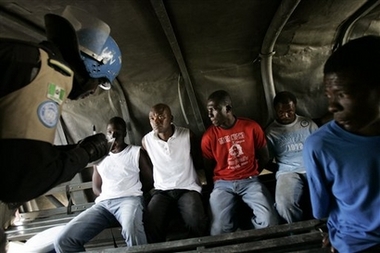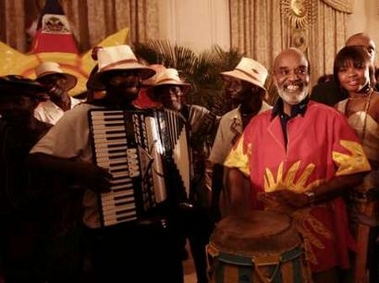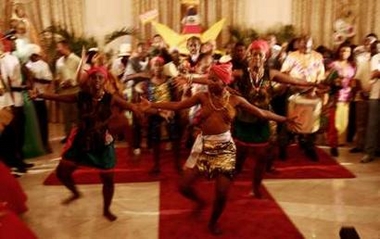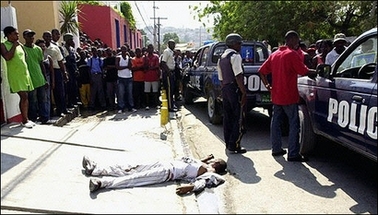|
| Correspond with us, including our executive editor, professor
Yves A. Isidor, via electronic mail: |
| letters@wehaitians.com |
| Want to send this page or a link to a
friend? Click on mail at the top of this window. |
 Must
learndly read, too; in part, of intellectual rigor; in part, the repository of ultimate
knowledge Must
learndly read, too; in part, of intellectual rigor; in part, the repository of ultimate
knowledge
|
| Posted Wednesday, February 28, 2007 |
| Last remaining gang stronghold in Haitian slum seized |
| By Stevenson Jacobs, Associated Press Writer |
PORT-AU-PRINCE, Haiti, Feb. 28, 2007 - U.N. peacekeepers and Haitian police seized the
last remaining gang stronghold in Haiti's largest slum on Wednesday, the latest in a
series of military crackdowns aimed at stabilizing the impoverished and divided Caribbean
nation.
 |
| An U.N. Nigerian peacekeepers takes the names of alleged gang menbers
arrested during an operation in the area of Bois Neuf in the slum of Cite-Soleil
inPort-au-Prince,Wednesday, Feb. 28, 2007. The soldiers took over the gritty Bois Neuf
quarter, a base for armed gangs blamed for a wave of kidnappings and killings. Seven
suspected gang members were arrested in the raid but their leader, known as Beloney,
managed to escape. (AP Photo/Ariana Cubillos) |
No shots were fired as scores of U.N. troops entered the seaside slum of Cite Soleil in
armored vehicles and on foot, giving the international force sole authority over the
lawless area for the first time, according to one U.N. official.
The soldiers took over the gritty Bois Neuf quarter, a base for armed gangs blamed for
a wave of kidnappings and killings. Seven suspected gang members were arrested in the raid
but their leader, known as Beloney, managed to escape.
It was the last gang stronghold in Cite Soleil not occupied by the 9,000-strong U.N.
force, known by its French acronym, MINUSTAH. Peacekeepers seized two other gang
strongholds during raids earlier this month.
"In terms of territory, 100 percent of Cite Soleil is now controlled ... by
MINUSTAH with the support of the Haitian government," Brazilian military commander
Col. Magno Barroso told The Associated Press.
But U.N. spokeswoman Sophie Boutaud de la Combe gave a more conservative assessment,
saying only that peacekeepers "had established a presence everywhere that gangs had
controlled," but do not have full control over the entire slum.
Wednesday's raid coincided with the third anniversary of the uprising that toppled
former president Jean-Bertrand Aristide, Haiti's first democratically elected leader.
Aristide went into exile in South Africa.
At the United Nations in New York, U.N. deputy special representative Joel Bortroue
said the Haitian government desperately needs the support of the international community
if the fledgeling democracy is to stay afloat.
He said that countries such as Haiti, which are coming out of long periods of conflict,
have a strong tendency to relapse unless there is "strong and coherent support from
the international community."
Bortroue said funds must be "injected" into impoverished areas in the form of
food distribution and school funding, as well as labor intensive projects such as
rebuilding schools and cleaning canals that could spur economic development.
"There is an urgency ... to show the population there's a difference between the
time when gangsters used to run the show and when the government runs the show now,"
Bortroue said. ____ AP writer Tracee Herbaugh at the United Nations contributed to this
report
| Posted Monday, February 26, 2007 |
| Posted Friday, February 23, 2007 |
| Posted Wednesday, February 21, 2007 |
| Posted Tuesday, February 20, 2007 |
| Posted Monday, February 19, 2007 |
| Nothing at all to do for dirt-poor Haiti, increasingly violent
Haiti, extreme violence-issued President Preval now "carnival king, lead
musician" |
 |
| Haitian President Rene Preval (R) plays the drum during a ceremony for Haiti's
carnival at the National Palace, February 18, 2007. REUTERS/Eduardo Munoz |
|
|
 |
| Haitians dance during a ceremony for Haiti's carnival at the National Palace in
Port-au-Prince, Haiti, February 17, 2007. REUTERS/Eduardo Munoz |
|
|
|
|
| Posted Saturday, February 17, 2007 |
| Posted Thursday, February 15, 2007 |
| U.N. to keep peacekeepers in Haiti 8 more months |
UNITED NATIONS, Feb. 15, 2007 (AP) -- The Security Council voted unanimously Thursday
to extend the U.N. peacekeeping mission in Haiti for eight months following an agreement
between the United States and China on the length of the new mandate.
 |
| A Haitian man killed by an unknown gunmen lays in the road in Delmas, a
suburb of Port-au-Prince in January 2007. The Security Council unanimously agreed to
extend for eight months the mandate of UN peacekeepers in Haiti and directed them to crack
down harder on criminal armed gangs preying on slum-dwellers.(AFP/File/Thony Belizaire) |
In a report in December, former U.N. Secretary-General Kofi Annan recommended that the
8,800-strong mission be extended for one year when its mandate expired February 15, a view
backed by the Friends of Haiti, whose members include the United States, Canada, Brazil,
France and Britain.
But China, which has no diplomatic relations with Haiti, pushed for a six-month
mandate.
Diplomats in Haiti have said China wanted the shorter mandate because of Haiti's
support for Taiwan's bid to join the United Nations. Haiti is one of a handful of
countries that has diplomatic ties with Taiwan. China and Taiwan split amid civil war in
1949, but Beijing still claims sovereignty over the island.
During negotiations, diplomats said China proposed an eight-month extension for the
force, but the U.S. wanted a nine-month extension.
"We have agreed to eight months in the interests of continuing the presence on the
ground, but we did support the Friends of Haiti position of 12 months," said U.S.
deputy spokesman Ben Chang.
Acting U.S. ambassador Alejandro Wolff called the vote " an important signal of
the determination of the international community" to support the U.N. mission.
"This is good news," he said, noting that all previous extensions had been
for six months and this was the lengthiest extension for the mission.
China's U.N. Ambassador Wang Guangya said Beijing hopes that during the next eight
months, Haiti can move from a peacekeeping operation to a peacebuilding mission.
He complained that the resolution was "not as balanced and comprehensive as
expected" because it "overemphasizes military means but fails to pay adequate
attention to political reconciliation and economic recovery."
Nonetheless, Wang said, "China agreed to put aside some pending issues to
facilitate consensus." He expressed hope that these issues will be addressed when the
council considers renewing the mandate in October.
Peacekeepers arrived in Haiti in July 2004 to quell unrest sparked by an uprising that
led to the ouster of former president Jean-Bertrand Aristide.
The U.N. peacekeeping force -- which includes about 125 Chinese police officers -- has
recently stepped up offensives to root out armed gangs that hold sway in slums in Haiti's
capital, Port-au-Prince. The gangs are blamed for a wave of kidnappings and other
violence.
The resolution calls on the U.N. force to "continue the increased tempo of
operations" against the armed gangs to support the Haitian police "to restore
security, notably in Port-au-Prince." It encourages the government and the U.N. force
"to undertake coordinated deterrent actions to decrease the level of violence."
It asks the U.N. force "to accelerate efforts to reorient its disarmament,
demobilization and reintegration resources towards a comprehensive violence reduction
program" in coordination with the government.
The resolution recognizes the government of Haiti's "ownership and primary
responsibility ... over all aspects of the country's stabilization and good
governance" and the U.N. role in supporting the government's efforts.
Copyright 2007 The Associated Press.
| Wehaitians.com, the scholarly journal of
democracy and human rights |


